
- Home
- About Us
- Sustainability
- Investors
- News
- People & Culture
-
Regions
Artificial intelligence (AI) is potentially the most powerful tool for inclusive growth in Africa, but the continent is in a race against time and must act with urgency to overcome the risk of further inequality and the creation a digital underclass. This is according to the continent’s largest mobile operator MTN Group.
“We must be obsessed and paranoid about not being left behind,” MTN Group President and Chief Executive Officer Ralph Mupita told The Kgalema Motlanthe Foundation (KMF) Inclusive Growth Forum over the weekend.
He said Africa’s path to inclusive AI required speedy action on six fronts.
Firstly, AI needs more abundant electricity supplies to drive economic growth. The IEA has estimated that Africa’s energy and climate-related goals by 2030 require annual investments of more than US$200 billion. The International Monetary Fund has said that all data centres combined use as much power as some of the world’s largest economies, and data centre power demand may triple by 2030.
As Africa has less than 2% of global data centre capacity, Mupita said it needs to invest heavily in digital infrastructure, beyond investment in fibre and subsea cables. The International Telecommunication Union has said that Africa needs around US$96 billion until 2030 to plug the digital infrastructure capex gap.
Thirdly, Africa needs to speed up the development of its own large language models (LLM) to power AI-driven solutions for its 1.5 billion people. There are more than 2 000 distinct African languages and Mupita said that fewer than 2% of them are supported by mainstream LLMs.
He was building on comments he made in New York in September on the sidelines of the United Nations General Assembly, when he took up a call to action from Nigeria for MTN Group to support the collection of datasets of African languages, including funding academic research into the continent’s languages.
This followed the launch of the Nigerian Atlas for Languages & AI at Scale (N-ATLAS) – an open-source multilingual LLM designed to understand and generate Nigeria’s diverse voices and create datasets for AI solutions.
Mupita told the KMF gathering that Africa must act with urgency to develop strong digital and AI skills. “This is an opportunity to enable Africa’s rich pipeline of youth, which will make up the world’s largest workforce by 2050,” he said, adding that by 2030, there would be an estimated 230 million digital jobs in sub-Saharan Africa.
“We must ensure that new jobs and augmented jobs are greater than the jobs lost, particularly with the youth divided that Africa will have.”
Calling AI a tool to solve Africa’s unique challenges, particular in high impact sectors, Mupita said Africa needed to combine traditional AI and generative AI for the greatest value across key use cases in key sectors such as healthcare, education and agriculture.
Finally, he said if Africa was to turn its ambition into reality and create – not merely consume – AI, partnerships were essential. “To give African AI initiatives scale and joint success, governments, the private sector and civil society must partner on policy, data governance and skills development. And we must do this without delay.”
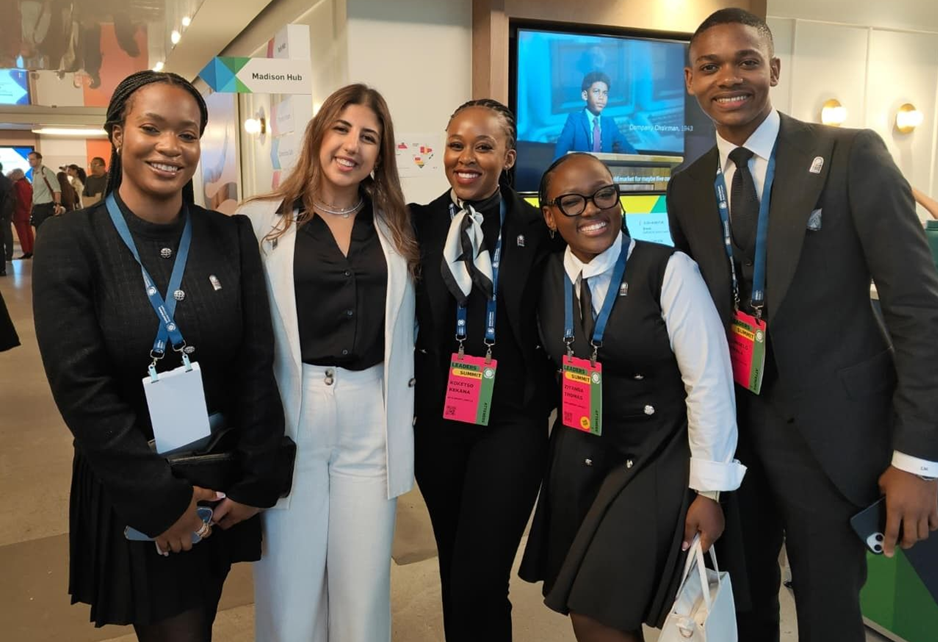
With only five years left to achieve the United Nations Sustainable Development Goals, the call for acceleration has never been more urgent. Progress remains uneven across the globe, and Africa in particular faces pressing challenges of inequality, youth unemployment and safety. It is against this backdrop that the UN Global Compact hosted its annual SDG Innovation Accelerator Programme during the United Nations General Assembly, showcasing bold business-led solutions that can help drive faster progress.
Representing South Africa, MTN’s graduate team won top honours and was selected as one of only two African teams to present their innovation at the UN Global Compact Leaders’ Summit in New York. Their project, an AI-powered solution to protect children online, responds directly to the alarming rise in digital harms, with child sexual abuse material increasing by more than 6000 percent globally and cyberbullying up by 450 percent. The solution is designed to shield children from predators, limit exposure to harmful content and reduce online bullying. It directly advances SDG 16.2 on ending abuse, exploitation and violence against children, while contributing to SDG 3 on health and well-being.
Dr Achieng Ojwang, Executive Director of UN Global Compact South Africa, stressed the importance of momentum. “The SDGs will not be met at the current pace, which is why programmes like the Accelerator are critical. They empower young professionals to create the type of bold, scalable solutions that can fast-track progress. The MTN graduates demonstrated that Africa is not only contributing but leading in tackling issues such as child online safety.”
The project was developed by graduates Lungelo Gwala, Senam Tsormetsri, Ziyanda Thomas and Koketso Kekana. As the youngest participants in the Accelerator, they exemplify the dedication and ingenuity of Africa’s youth. With the support of mentors including Asanda Nkungwana, MTN Group Sustainable Product Development Lead, Lazarus Mosako and Maanda Rashaka the UNGC Mentorship and Coaching team, the team transformed their concept into a viable solution with potential for large-scale impact.
Reflecting on their journey, Lungelo Gwala noted: “The Accelerator gave us the chance to show that African ideas can help accelerate progress on the SDGs. Representing South Africa at the UN reinforced that our generation has the power to shape a safer digital future.” Ziyanda Thomas added: “Being part of a global platform reminded me that Africa’s voice must not only be heard it must lead. YelloGuard may be a modest innovation today, but its potential to safeguard millions of children across the continent is profound.”
This recognition not only highlights MTN’s commitment to youth empowerment but also underlines Africa’s pivotal role in driving the acceleration needed to achieve the UNSDGs by 2030.

By Marina Madale, Executive: Sustainability & Shared Value, MTN Group and Monde Twala, Senior Vice President, Paramount Africa
“The digital world is no longer a place young people visit, it’s where they live.” – Marina Madale
“When we use platforms like MTV to spark difficult conversations, we shift from entertainment to real impact.” – Monde Twala
Last week, MTN and MTV Base launched The Room of Safety with the premiere of its first episode, “Why Internet Safety Matters”—a bold and timely response to the evolving risks and responsibilities facing Africa’s youngest digital citizens. With AI companions on the rise and social feeds curating idealised versions of reality, today’s online experiences are more immersive, personal, and emotionally charged than ever before.
While AI, deepfakes, and virtual influencers may sound like Silicon Valley phenomena, their consequences are playing out daily in African households, often on entry-level smartphones with little adult oversight.
The Invisible Friend on the Other Side of the Screen
Across MTN markets, over 70% of internet users are under the age of 30. In MTN-commissioned research with IPSOS across three African countries, 1 in 3 youth reported interacting with an AI companion, chatbot, or virtual assistant, many for emotional connection, curiosity, or entertainment.
“Young people turn to these AI tools in search of support, validation, even companionship,” explains Monde Twala. “But we must ask, are these systems equipped to deal with emotional complexity, or are they simply mimicking empathy to keep users engaged?”
Twala adds that The Room of Safety was intentionally brought to life through MTV Base, one of the continent’s most influential youth platforms: “We wanted to use a trusted cultural voice not just to entertain, but to educate. These conversations can’t live in policy papers, they need to be in playlists, timelines and conversations with real-life resonance.”
Why It Matters Now
In the first episode, young people reflect on the emotional pressure of navigating online life. “Comparison is the thief of joy. It’s a quote I live by,” shares Yanda Woods in the episode, capturing the silent impact that curated perfection can have on young people’s mental health. Foyin Ogunrombi adds, “The difference between real success and the curated version we see on social media is exactly that—social media is heavily curated.”
In a digital landscape where perfection is the norm and imperfections are hidden, many young users are left feeling inadequate, isolated, and increasingly drawn toward online artificial relationships that don’t always serve their emotional needs.
A 2023 UNICEF study on Child Online Protection in Sub-Saharan Africa found that 47% of adolescents in urban centres had encountered harmful or inappropriate content online, often pushed by opaque algorithms designed for engagement, not care.
Critical Thinking Is Now a Survival Skill
“We’re no longer just teaching digital access—we’re teaching digital discernment,” says Marina Madale. “Today’s youth must know how to ask: Who built this? Why is it suggesting this? Is it helping me, or harvesting me?”
She recalls a question raised: “If an AI bot gives you advice that makes you feel worse, is it your fault for listening?” It’s a troubling thought, but one that reflects the confusion many young users face when lines between real and artificial support are blurred.
The Room of Safety encourages not just awareness, but self-inquiry, empowering youth to approach digital platforms with more confidence, agency, and understanding.
One Simple Act That Could Save a Life
One of the most powerful takeaways from Episode 1 is the reminder that you are enough, even without the filter. In a world that constantly measures worth through likes, follows, and curated perfection, the ability to believe in yourself, without needing external validation, is a radical act of self-preservation.
TheRoom of Safety encourages young people to turn inward for affirmation and to trust their instincts, rather than relying on AI companions or online approval to feel seen. Building self-worth from within is not easy, but it is essential, and often begins with honest conversations, not with machines, but with real people: a teacher, a caregiver, a sibling, a friend.
To support this, MTN’s campaign includes direct links to mental health services, child protection resources, and regional helplines across its markets. These are not just add-ons, they are lifelines.
A New Digital Mandate for Africa
With the youngest and fastest-growing online population in the world, Africa faces a pivotal moment. The task ahead is not just to connect, but to protect. The Room of Safety is a rallying cry, not to fear technology, but to shape it with intention and empathy.
“When platforms like MTV are used to spark difficult conversations, we move from passive awareness to real impact,” says Monde Twala. “This campaign is about creating spaces that are not only engaging, but safe and transformative.”
Marina Madale concludes, “The same technology that threatens can also be used to empower, if we give our children the tools to engage with it wisely. The Room of Safety is just the beginning of that journey.”
The next episode will explore cyberbullying, where to draw the line between banter and harm, and how to speak up when it matters most.
Until then, we are left with a question:
If a young person is turning to a chatbot to feel seen, will the digital world they find be a bridge, or a blindfold?
The answer may shape the next generation of Africa’s digital future.
Accra, Ghana, June 22, 2025 – Demonstrating its commitment to advancing Africa’s development, MTN Group supported the 2025 Economic Governance School training for public officials from Ghana, South Africa and Kenya held in Accra last week.
The initiative, the result of collaboration between South Africa’s National School of Government (NSG), the Kenya School of Government (KSG) and the Ghana Institute of Management and Public Administration (GIMPA), is designed to strengthen senior leadership in the public sector and promote inclusive economic governance across the continent. It brings together legislatures, politicians and senior officials from all levels of the public service for a week of peer learning, policy dialogue and institutional exchange. Consequently, the delegation took time to visit the African Continental Free Trade Area (AfCFTA) Secretariat, which is charged with coordinating the creation of a single continental market for goods and services across Africa.
“As a pan-African business, we understand that Africa’s growth depends not only on investment in infrastructure, but also in people and institutions,” said Nompilo Morafo, MTN Group Chief Sustainability and Corporate Affairs Officer.
Since the training took place during MTN Group’s flagship 21 Days of Y’ello Care, the delegation also visited the MTN Ghana supported Opportunities Industrialisation Centre (OICG), which provides vocational, digital and entrepreneurial skills training for young people to enable them to earn a decent and dignified living.
“At MTN, we believe that everyone deserves the benefits of a modern connected life; therefore, in our view, education, training and strong institutions form the foundation for sustained progress. Also, when civil servants, policymakers and administrators are equipped with high-quality training, their collective decisions shape a more equitable, innovative and resilient future for their nations.”
MTN’s involvement reflects its broader approach to driving Africa’s progress through investment in leadership and institutional capacity. In addition to sponsoring the NSG, KSG and GIMPA programme, the Group contributed to the discourse, with senior executives participating in sessions focused on telecommunications, digital transformation, artificial intelligence and infrastructure financing.
MTN Ghana CEO Stephen Blewett and CIO Bernard Acquah joined Morafo in engaging on panels that explored the intersection of technology and governance. Discussions focused on the digital transformation of public services and the role of AI and infrastructure investment in supporting state capacity and economic inclusion.
South Africa’s Deputy Minister of Public Service and Administration Ms. Pinky Kekana, described the initiative as a valuable platform for engagement on governance challenges, saying: “The Economic Governance School offers a unique platform for elected and appointed public leaders to engage in critical analysis and reflective dialogue on the complex challenges confronting governance.”
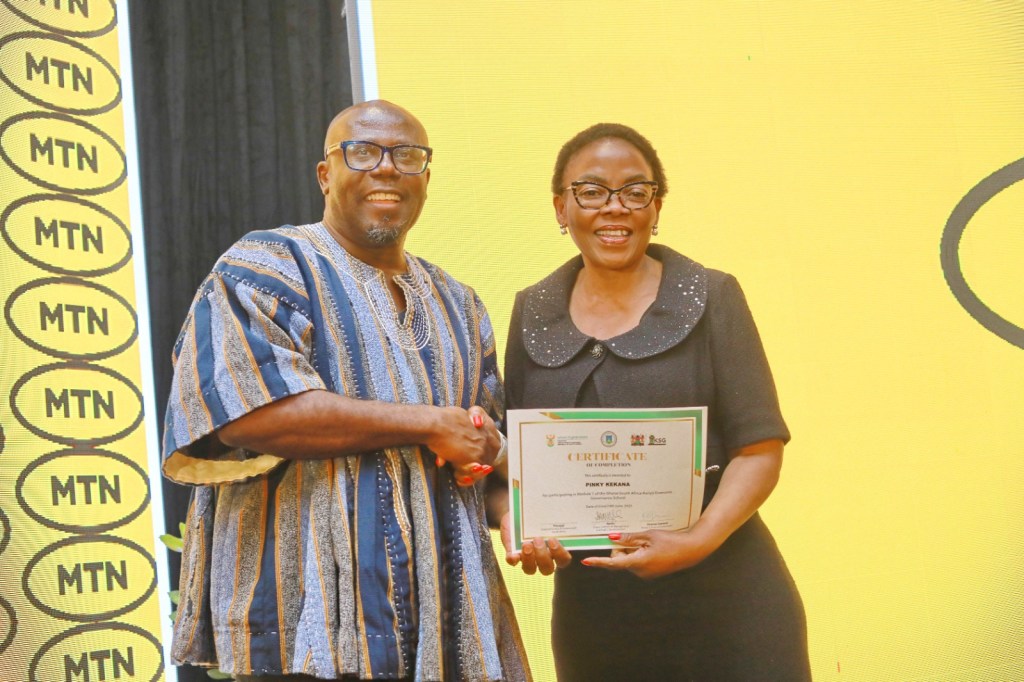
Director of GIMPA, Prof. Samuel Kwadwo Bonsu, welcomed MTN’s contribution and the cross-sector collaboration underpinning the programme: “We are proud as GIMPA to serve, not only as a centre of learning but as a convening ground for critical reflection and collaboration.”
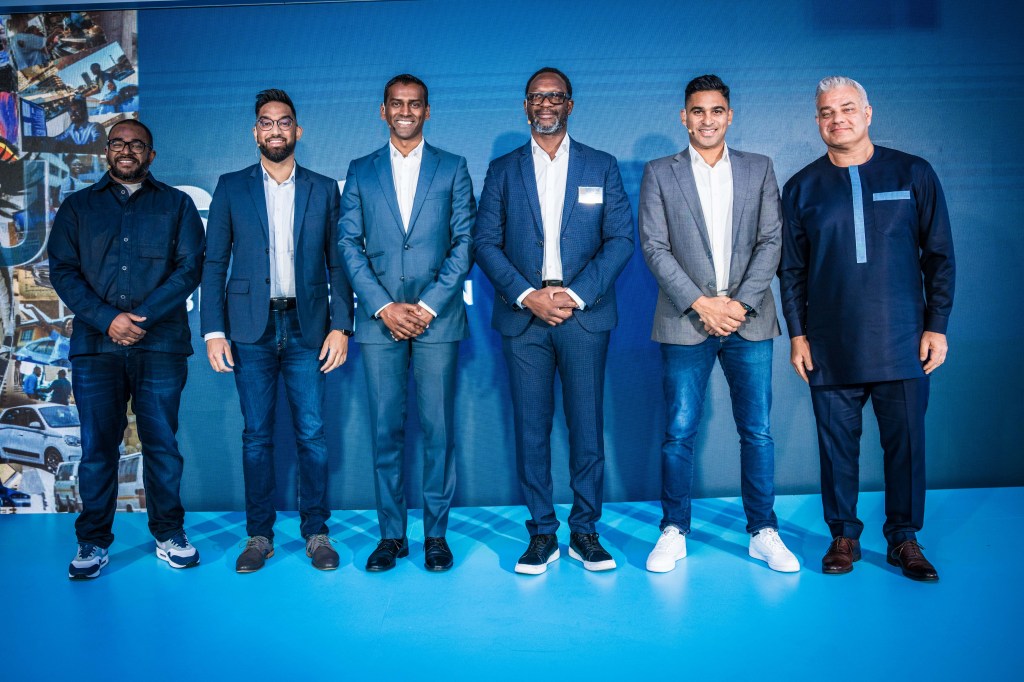
MTN and its digital platform business, Chenosis, in partnership with TransUnion Africa, has launched TransUnion Telco Data Score, a first-of-its-kind credit scoring solution that uses mobile phone call data records to help millions of South Africans with limited or no formal credit history gain access to financial services.
This alternative data scoring model leverages Call Data Records (CDR), which reflect patterns in mobile phone network usage behaviour and correlates it to an individual’s financial behaviour. By using telco data as a proxy for financial reliability, the TransUnion Telco Data Score enables lenders to accurately assess New-to-Credit (NTC) consumers and expand access to safe, affordable credit.
Helping the Financially Excluded
According to TransUnion estimates, over 1.4 million credit-invisible South Africans open new credit accounts each year, contributing to more than four million new accounts over the past three years. Yet traditional scoring models often fail to assess this segment accurately, leaving more than 16 million adults outside the formal credit system.
Approximately 35% of New-to-Credit consumers are under the age of 25, many of whom are new to the workforce and often use credit to buy clothing for work, highlighting the need for innovative tools that support younger, digitally active individuals who may lack a conventional credit footprint. Successfully integrating these and other excluded consumers into the economy could add approximately R173 billion1 to South Africa’s GDP.
“With over 500 million2 people across the continent excluded from formal financial systems, the scale of the challenge is undeniable. Traditional data models fail to reflect the realities of African consumers, leaving millions without access to credit and the opportunities it enables. Financial inclusion isn’t just part of our mission, it’s our mandate,” said Lee Naik, CEO of TransUnion Africa.
“That’s why we believe the only way forward is to think differently, to lead with bold, African-born solutions. Innovations like TransUnion Telco Data Score, designed for Africa, by Africa, are helping us responsibly harness mobile data at scale. In doing so, we’re not only expanding access to credit, but we’re also unlocking economic potential, accelerating inclusive growth, and reshaping the future of finance across the continent.”
Creating Opportunity with Consent and Compliance
The use of CDR data is subject to explicit consumer consent and is managed in compliance with South Africa’s Protection of Personal Information Act (POPIA). MTN is responsible for consent management and will ensure that Chenosis, MTN’s API marketplace, facilitates the connection between MTN’s data ecosystem and partners like TransUnion in a secure and scalable manner.
“This partnership demonstrates how mobile technology and secure data sharing can support positive change in the financial sector and unlock new opportunities for millions of South Africans,” said Selorm Adadevoh, Group Chief Commercial Officer, MTN Group. “We are committed to ensuring that data is used responsibly, with the customer’s interests at the forefront. This is a model of what responsible innovation can look like.”
Empowering Lenders and Growing the Economy
For lenders, the TransUnion Telco Data Score has demonstrated a 25–35% improvement in predictive performance over previous alternative data models, based on recent pre-launch validations across the retail and banking sectors.
By adopting TransUnion Telco Data Score, lenders can better predict user behaviour and support responsible lending by ensuring that credit users at risk of default are not overexposed and can be effectively supported throughout their credit journey.
Importantly, the product also helps New-to-Credit consumers establish and build their credit footprint over time. According to TransUnion data, low-risk individuals significantly increase their credit exposure within 18 months of becoming credit active, underscoring the long-term benefits of responsible financial inclusion strategies.
“With Chenosis, we enable collaboration between mobile operators and solution providers while maintaining high security and compliance standards,” said Waseem Amra, GM – Products and Platforms. “This partnership highlights how secure data access can support innovation in financial services that can transform lives.”
This partnership between Transunion Africa, MTN, and Chenosis reflects the growing trend of using diverse data sources to create more accurate and inclusive financial access. Integrating mobile network insights into credit scoring provides a practical and scalable way to reach more individuals, while maintaining high standards of privacy and compliance.
“With this inclusive innovation, TransUnion has taken the lead in creating an impactful solution to one of the continent’s most pressing challenges – finding responsible pathways to greater financial inclusion that will unlock opportunities for individual and national growth. By turning mobile data into meaningful opportunity, we have set the standard in making transformation possible by showing how technology can be used in groundbreaking alternative ways. Together with MTN and Chenosis, we are building a future where every South African, regardless of their financial history, has the chance to be seen, to be trusted, and to thrive,” Naik concluded. “When financial institutions can measure risk more effectively, they can lend more confidently, and more consumers can access opportunity, and that’s a win for everyone.”
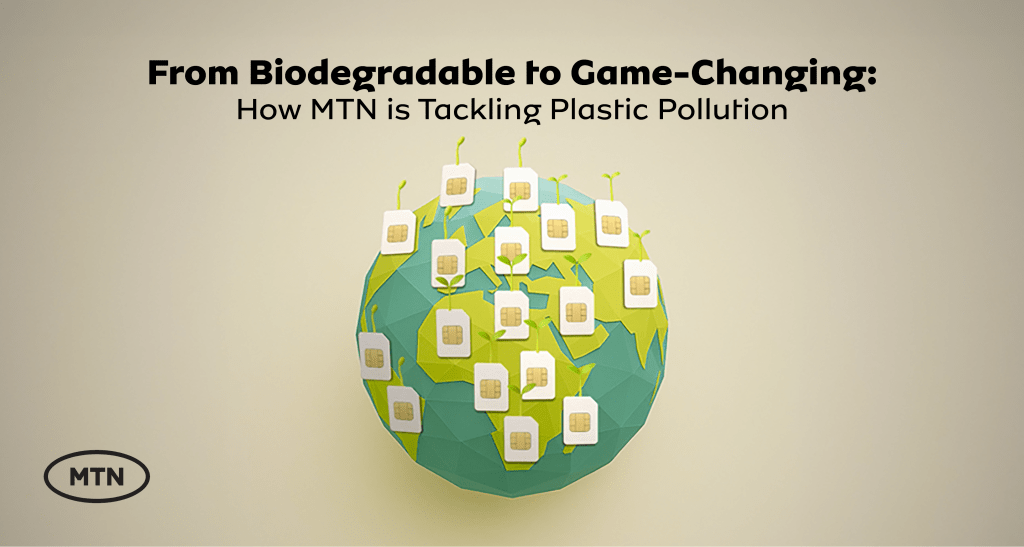
Global plastic production, exceeding 400 million tonnes annually, demonstrates that plastic pollution remains an urgent challenge. More than half of it is designed for single use. The message for World Environment Day 2025 is unequivocal, we need to beat plastic pollution, and we need to do it with urgency.
This issue touches every sector. Telecommunications is no exception. While mobile operators are typically associated with connectivity, the industry has a legacy plastics problem hiding in plain sight. In 2020 alone, approximately 4.5 billion plastic SIM cards were produced globally. These small plastic cards are widely used and rarely recycled. Many end up in landfills or as litter. Others are incinerated, contributing to emissions. They are not the most visible source of waste, but they are a meaningful one, and entirely avoidable.
At MTN, we have taken a deliberate step to reduce this form of plastic waste. In 2024, we introduced bioSIMs, SIM cards made from 100% biodegradable, FSC-certified paper. They perform exactly like plastic SIMs but break down naturally when discarded. No harmful residue. No microplastic. Just responsible design, built for a more sustainable future.
The rollout began in Rwanda and expanding across other markets. It is a practical innovation grounded in science, not sentiment. And while it won’t solve plastic pollution on its own, it is part of a larger, necessary shift in how telecoms, and business at large, approach environmental responsibility.
Africa has a central role in this conversation. The continent contributes just 3–4% of global greenhouse gas emissions, yet it faces some of the worst consequences of climate change. At the same time, Africa is grappling with an accelerating waste challenge. By 2060, annual plastic waste in sub-Saharan Africa is projected to reach 116 million tonnes, a sixfold increase from 2019. The region’s rapid urbanisation and insufficient waste infrastructure make it highly vulnerable to both climate and pollution shocks.
It’s essential. Every tonne of plastic avoided reduces long-term risk, for people, infrastructure, and the planet. Our bioSIMs are part of a broader commitment at MTN to embed sustainability across our operations. As the UNEP reminds us, the solutions are available. What we need now is implementation at scale. Scaling starts with design. The average SIM card may weigh just four grams, but multiplied across millions of users, the footprint grows quickly. A small change in design, if adopted broadly, can remove tonnes of plastic from the supply chain each year. That’s the logic behind our bioSIM. It is efficient, cost-effective, and fundamentally better for the environment.
We are also expanding eSIM adoption, which removes the need for a physical card altogether. Combined, these efforts enable our customers to reduce their impact through the choices they make every day. That is where real momentum lies, not just in corporate strategy, but in shifting consumer norms.
This World Environment Day, the message is clear. Plastic pollution is a problem that can be solved. But doing so will require collective action, practical innovation, and a willingness to change how we operate. MTN is committed to being part of that change, starting with how we connect the communities we serve.
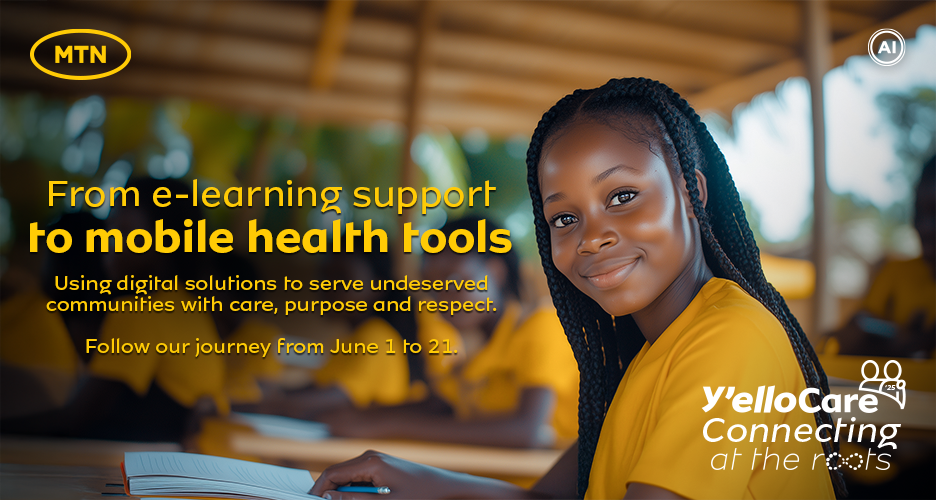
MTN Group is pleased to announce the 2025 edition of 21 Days of Y’ello Care, our highly anticipated flagship employee volunteerism campaign, taking place from 1-21 June 2025.
Now in its 18th year, Y’ello Care continues to demonstrate the power of employee-led action to drive meaningful change across the communities we serve. Since its inception, the campaign has mobilised thousands of MTN employees to support impactful initiatives focused on education, health, youth development, and economic empowerment.
Each year, the campaign evolves to reflect the most pressing needs of society, while remaining grounded in our commitment to enable the benefits of a modern connected life for everyone. Over the past 6 years, we have reached the lives of 107,034 people across our communities through the impact of 14,376 MTN volunteers completing 56,306 cumulative hours of community engagement.
This year’s theme, “Connecting at the Roots – Connecting communities through the use of digital tools,” responds to the ongoing challenge of digital exclusion, particularly in rural, remote, and underserved areas. Across many parts of Africa, limited connectivity continues to constrain access to education, healthcare, financial services, and economic opportunity. Women, youth, persons with disabilities, and displaced populations are disproportionately affected.
Y’ello Care 2025 will see MTNers across our markets implement practical, community-led initiatives that leverage technology to unlock connectivity to bridge these gaps.
“Y’ello Care reflects our belief that real progress begins at the grassroots level. In 2025, we are focusing our efforts on the communities that remain on the margins of digital access and connectivity. By applying technology in ways that are practical, inclusive, and sustainable, we are working to ensure that no one is left behind,” said Nompilo Morafo, MTN Group Chief Sustainability and Corporate Affairs Officer. “Our people remain the driving force behind this campaign, and their continued commitment to serving with purpose is what makes Y’ello Care a true embodiment of MTN’s values.”
In line with MTN’s values, the campaign prioritises meaningful partnerships, responsible delivery, and inclusive engagement. Through trusted collaborations with community stakeholders, we aim to develop practical solutions that are responsive to local contexts, respectful of community aspirations, and inclusive of those most often excluded from digital progress.
Through Y’ello Care, MTN reaffirms its belief in the transformative power of technology and in the ability of our people to be agents of positive change. We look forward to working together with communities and partners to deliver meaningful, sustainable impact where it is needed most.
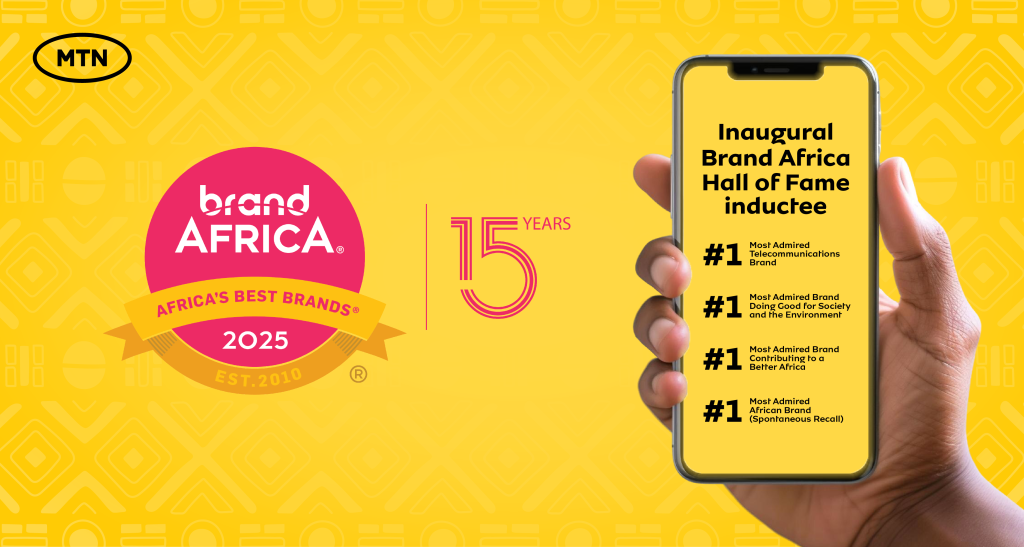
MTN Group has been inducted into the inaugural Brand Africa Hall of Fame “in recognition of its transformational impact on African consumers and its role in shaping a positive African narrative”. MTN was also recognised as the #1 Most Admired African Brand Contributing to a Better Africa; the #1 Most Admired African Brand (spontaneous recall); the #1 Most Admired Brand Doing Good for Society and the Environment; and #1 Most Admired Telecommunications Brand.
The Hall of Fame honour, introduced this year by Brand Africa, acknowledges brands that have demonstrated sustained excellence and influence on the continent over the past decade. MTN’s induction reflects its ongoing commitment to enabling digital access, expanding financial inclusion, and contributing meaningfully to Africa’s development.
The announcement was made alongside the release of the 2025 edition of the Brand Africa 100 rankings – an annual, independently conducted survey spanning more than 30 African countries and representing more than 85% of the continent’s population and GDP.
“It is an honour to be inducted into the Brand Africa Hall of Fame and to be named the most admired African brand contributing to a better Africa, the most admired African brand by spontaneous recall, as well as the brand most admired for doing good for society and the environment,” said Ralph Mupita, MTN Group President and CEO.
“That this recognition comes during Africa Month gives it added significance. It reflects the progress we continue to make as a continent and the role trusted brands must play in advancing inclusive, digitally enabled growth. We are grateful for the confidence placed in MTN by the people we serve and remain committed to delivering meaningful impact.”
Mupita also acknowledged the collective effort behind the brand’s success, thanking MTNers, partners, and other stakeholders across the continent for their role in making this recognition possible.
MTN operates mobile networks in 16 countries. Since 2021, the company has been guided by its Ambition 2025 strategic intent of Leading digital solutions for Africa’s progress. This underscores MTN’s commitment to driving digital and financial inclusion and fostering innovation across the continent.
Further validating its brand leadership, MTN was recently ranked once again as South Africa’s most valuable brand. The accolade was made in the 2025 Brand Finance Top 100 Report, which accorded MTN a brand valuation of R50.7 billion. MTN has held this position every year since the survey’s inception in 2012.
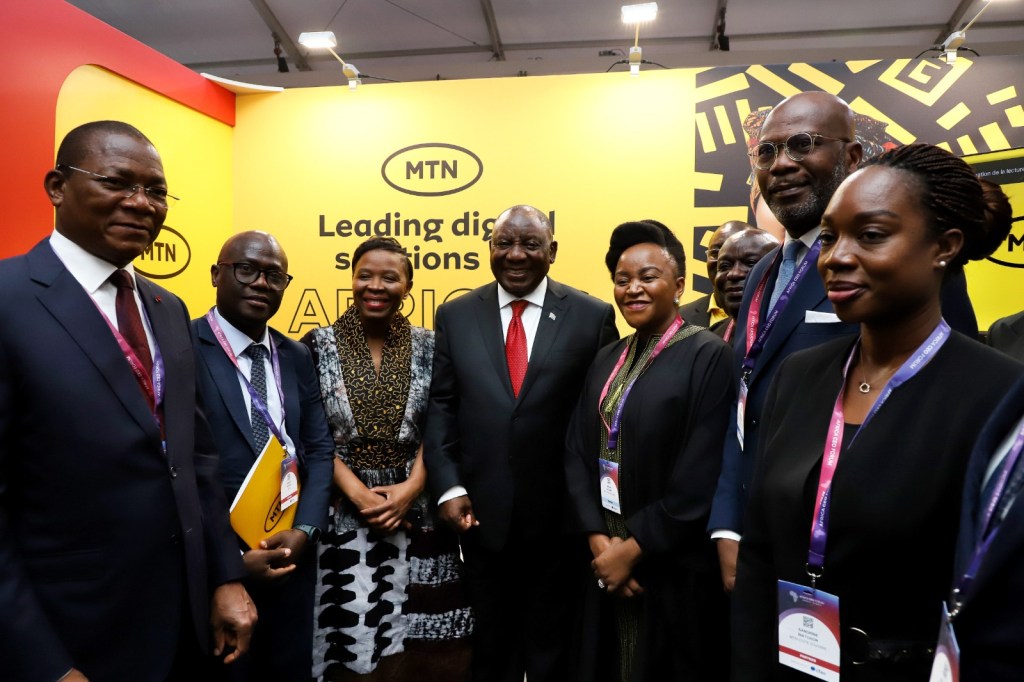
As part of our work to deepen stakeholder relations and partnerships for Africa’s progress, MTN Group is a platinum sponsor of the Africa CEO Forum, which brings together the continent’s most influential decision-makers for two days of meetings on the private sector’s key role in accelerating Africa’s development.
The 12th edition of the annual summit is taking place in Abidjan on 12–13 May 2025. Some 2 000 business leaders, investors and policy makers are in attendance to shape practical strategies to expedite Africa’s economic transformation.
The theme for 2025 is ‘Africa in a transactional world: Can a new deal between state and private sector deliver the continent a winning hand?’. It recognises the need for governments to strike a new deal with the African private sector, anchored on three pillars: an improvement of governance and accountability; targeted public policies to address Africa’s structural challenges; and the accelerated implementation of the African Continent Free Trade Agreement (AfCFTA).
“At part of our shared value priority to support Africa’s progress, we at MTN seek to align with the priorities of our continent and nation states and to actively engage governments and regulators to help shape industry dynamics,” said MTN Group Chief Sustainability and Corporate Affairs Officer Nompilo Morafo.
“MTN’s participation at the Africa CEO Forum reflects our nation states programme and our commitment to work together to enable inclusive growth,” she added, noting that escalating tensions in world geopolitics present headwinds to Africa’s budding economic recovery. “We believe the continent’s sustainable progress will come from trusted partnerships, coherent policy environments and shared investment in the systems that power Africa’s digital and economic future.”
As part of the Forum programme, MTN Group Senior Vice President: Markets, Ebenezer Asante, is participating in a panel discussion exploring tax policy and resource mobilisation. The session focuses on how public and private sector stakeholders can consult and collaborate to ensure fiscal environments that support both domestic priorities and the stability required for sustained investment.
MTN Côte d’Ivoire CEO Mitwa NG’ambi is contributing to a strategic roundtable on Africa’s digital transformation. This is looking at strategies to enhance network resilience and accelerate infrastructure deployment – particularly in underserved areas – and the role of policymakers in fostering an investment-friendly environment that accelerates digital transformation.
MTN Group’s sponsorship and participation at the Africa CEO Forum underscore our commitment to building a more connected, inclusive and prosperous Africa.
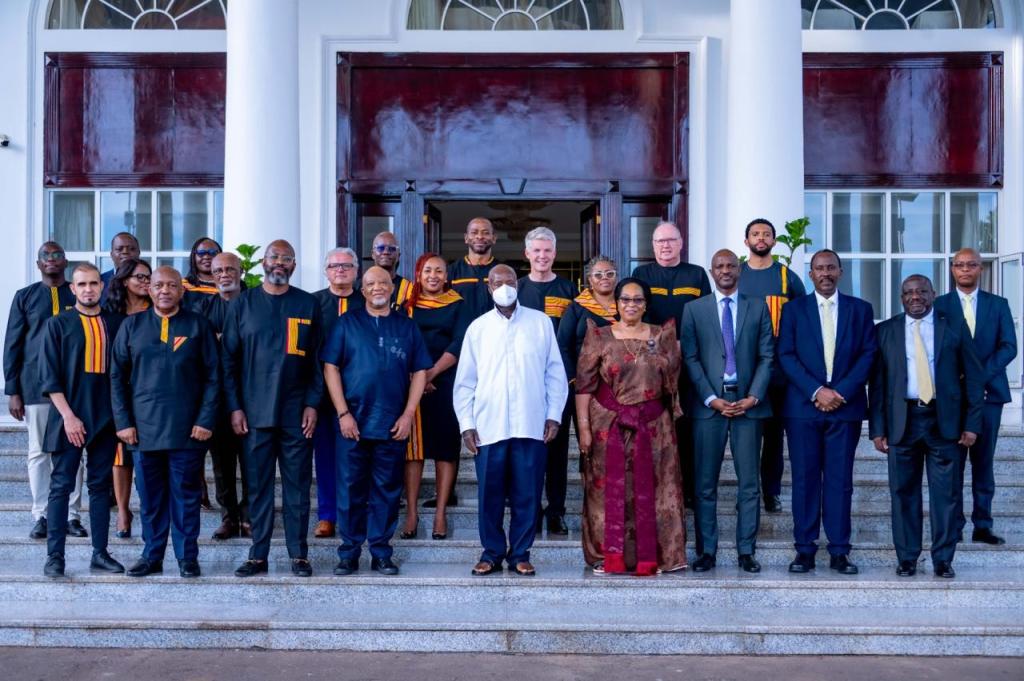
MTN Group this week convened its annual Chairmen’s Forum in Uganda, bringing together Board Chairs from its operating companies and senior executives from across the business. Held in Kampala, the Forum serves as a key leadership platform to reflect on strategic progress, strengthen alignment, and advance the Group’s ambition to lead digital solutions for Africa’s progress.
On the sidelines of the Forum, the MTN Group delegation, led by Group Chairman Mcebisi Jonas and Group President and Chief Executive Officer Ralph Mupita, engaged with national leaders and key stakeholders to reinforce the Group’s long-standing commitment to Uganda as a strategic market.
These engagements included a high-level meeting with His Excellency President Yoweri Kaguta Museveni at State House, Entebbe, as well as a stakeholder dinner hosted by MTN, attended by senior government officials.
During the State House meeting, President Museveni welcomed MTN’s continued investment and emphasised the importance of targeting sectors that generate employment and expand the economy. “If people have jobs and incomes, they will buy more phones and use them more,” he said. “That’s why we must invest in the four key sectors of wealth and job creation: commercial agriculture, manufacturing, services, and ICT.” He further encouraged MTN to explore cross-border investment as a means of promoting regional integration and intra-African trade.
Uganda holds a distinct place in MTN’s history as the first country outside South Africa where the Group secured a telecommunications licence. Granted in 1998, this licence marked the beginning of MTN’s international expansion, laying the foundation for what would become one of Africa’s leading digital infrastructure and platform businesses. Today, MTN Uganda stands as one of the Group’s most important markets, commercially and developmentally.
Mcebisi Jonas, MTN Group Chairman, expressed appreciation for the long-standing collaboration between MTN and the Government of Uganda. “We just came today to say thank you very much for the support you have always given us. We have had excellent collaboration from the regulators, and MTN is not here for the short term—we are here for the long haul,” he said. He also emphasised MTN’s interest in strengthening trade and business linkages between Uganda and South Africa, and highlighted the Group’s broader capacity to support national development. “We believe there is real opportunity to help Ugandan businesses enter the South African market, and that is something we can explore further.”
As MTN Group continues to drive the acceleration of Africa’s digital future, Uganda remains a key partner, demonstrating the enduring value of early investment, collaborative nation-building, and a shared commitment to inclusive and sustainable progress.